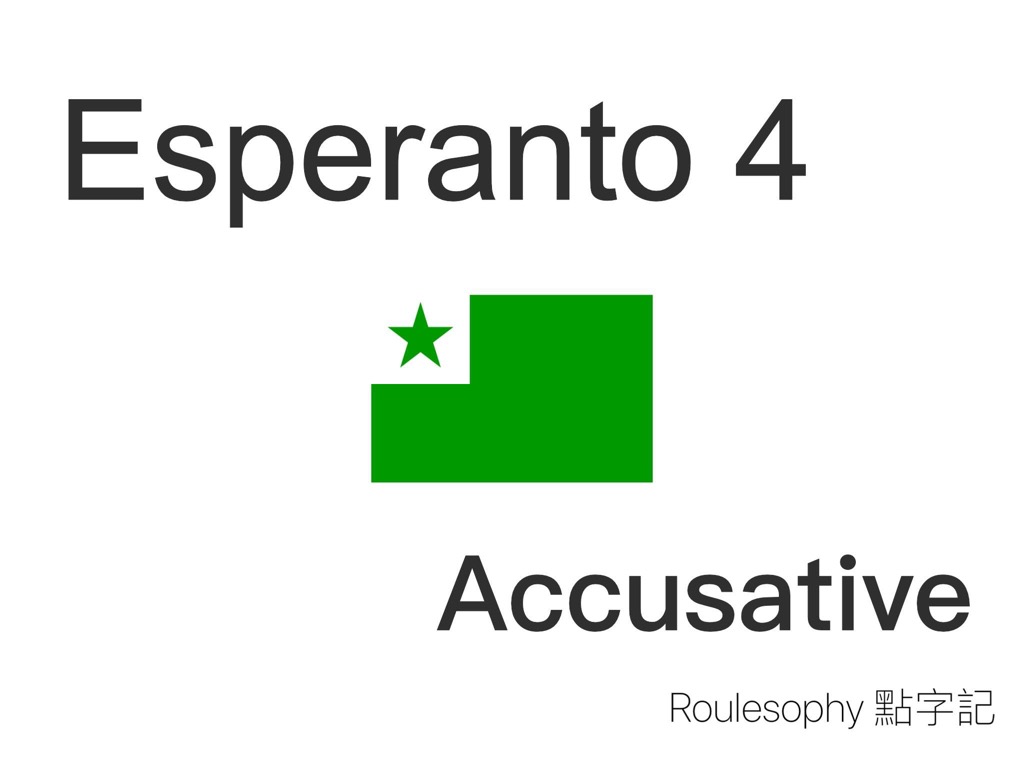
Accusative 是一個語言學的名詞,主要是用來表示一個動詞作用於的名詞。
文法規則
- 所有 Accusative 的名詞都以
n 作尾。 例如 Mi amas ŝin. (I love her) 中, mi 不是 accusative ,所以不用加 n 在 mi 後,而 amas 作用的名詞是 ŝi ,所以 ŝi 後要加 n 變成 ŝin 。
Section 1/4
| Esperanto |
English |
Comment |
| amas |
love |
|
| min |
me |
mi + n |
| lin |
him |
li + n |
| kisas |
kiss |
|
| viron |
man |
viro + n |
| ŝin |
her |
ŝi + n |
| renkontas |
meet |
|
例句
| Esperanto |
English |
Comment |
| Ĉu vi amas ŝin aŭ min? |
Do you love her or me? |
|
| Vi kisas ŝin! |
You kiss her! |
|
| Li renkontas ŝin kaj falas. |
He meets her and falls. |
|
| Ŝi kisas lin. |
She kisses him. |
|
| La virino kisas la viron. |
The woman kisses the man. |
|
| Ĉu vi amas min? |
Do you love me? |
|
| Ili renkontas lin. |
They meet him. |
|
| Ili renkontas la viron. |
They meet the man. |
|
| Ŝi amas lin kaj min! |
She loves him and me! |
|
| Vi kisas la viron! |
You kiss the man! |
|
Section 2/4
| Esperanto |
English |
Comment |
| manĝas |
eat |
|
| trinkas |
drink |
|
| kafon |
coffee |
kafo + n |
| pano |
bread |
|
| pomon |
apple |
pomo + n |
| akvo |
water |
|
| vin |
you |
vi + n |
| virinon |
woman |
virino + n |
例句
| Esperanto |
English |
Comment |
| Pano kaj akvo. |
Bread and water. |
|
| Li amas virinon. |
He loves a woman. |
|
| Ŝi kaj vi trinkas. |
She and you drink. |
|
| Li kaj la knabino manĝas. |
He and the girl eat. |
|
| La virino kisas vin. |
The woman kisses you. |
|
| Ĉu ŝi trinkas kafon? |
Does she drink coffee? |
|
| La pano estas bona. |
The bread is good. |
|
| Mi manĝas pomon. |
I eat an apple. |
|
| La virino trinkas kafon kaj akvon. |
The woman is drinking coffee and water. |
|
| Ni manĝas panon en la kafejo. |
We eat apple in the cafe. |
|
| La virino trinkas kafon kaj akvon. |
The woman drinks coffee and water. |
|
| Yes, it is bread. |
Jes, ĝi estas panon. / Jes, estas pano. |
|
| La knabo manĝas pomon. |
The boy is eating an apple. |
|
| Mi manĝas pomon. |
I am eating an apple. |
|
Section 3/4
| Esperanto |
English |
Comment |
| havas |
have |
|
| kuko |
cake |
|
| lakto |
milk |
|
| bongusta |
delicious |
|
| ĉokolado |
cholocate |
|
| ŝatas |
like |
|
| nin |
we |
ni + n |
例句
| Esperanto |
English |
Comment |
| Ŝi ŝatas ĉokoladon. |
She likes chocolate. |
|
| Ili havas lakton. |
They have milk. |
|
| La pomo kaj la kuko. |
The apple and the cake. |
|
| La virino kisas nin. |
The woman kisses us. |
|
| Ili trinkas bongustan lakton. |
They drink delicious milk. |
|
| Ili trinkas ĉokoladan lakton. |
They drink chocolate milk. |
|
| Vi ŝatas kukon. |
You like cake. |
|
| La lakto estas malbona. |
The milk is bad. |
|
| La ĉokolada kuko estas bongusta. |
The chocolate cake is delicious. |
|
| La virino havas bongustan ĉokoladon. |
The woman has delicious chocolate. |
|
| Vi ŝatas kukon. |
You like cake. |
|
Section 4/4
| Esperanto |
English |
Comment |
| ĵurnalo |
newspaper |
|
| domo |
house |
|
| libro |
book |
|
| letero |
letter |
|
| legas |
read |
|
| ilin |
them |
ili + n |
| ĝin |
it |
ĝi + n |
| vidas |
see |
|
例句
| Esperanto |
English |
Comment |
| Ili legas en la domo. |
They read in the house. |
|
| Knabino ŝatas la leteron. |
A girl likes the letter. |
|
| Mi vidas la pomon. |
I see the apple. |
|
| Mi vidas la libron kaj legas ĝin. |
I see the book and read it. |
|
| Mi ŝatas ilin. |
I like them. |
|
| Mi ne trinkas ĝin en la domo. |
I don’t drink it in the house. |
|
| La libro estas granda. |
The book is big. |
|
| Vi legas libron aŭ ĵurnalon. |
You are reading a book or a newspaper. |
|
| La letero estas en la domo. |
The letter is in the house. |
|
| Knabino ŝatas la leteron. |
A girl likes the letter. |
|
| Li kaj ŝi legas ĵurnalon. |
He and she read a newspaper. |
|
| Ni vidas la leteron kaj ŝatas ĝin. |
We see the letter and like it. |
|
